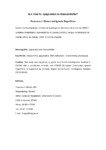Is It Time for Epigenetics in Osteoarthritis?

Use este enlace para citar
http://hdl.handle.net/2183/26415Coleccións
- Investigación (FCS) [1295]
Metadatos
Mostrar o rexistro completo do ítemTítulo
Is It Time for Epigenetics in Osteoarthritis?Data
2014-05-16Cita bibliográfica
Blanco FJ, Rego-Pérez I. Is it time for epigenetics in osteoarthritis?. Arthritis Rheumatol. 2014:66(9):2324-7
Resumo
[Abstract] DNA methylation is an epigenetic mechanism of reversible gene regulation which typically results in gene silencing upon hypermethylation in high CpG density regions of promoters (termed CpG islands), and increased gene expression when methylation occurs in gene bodies. Prior information on OA-associated changes in DNA methylation are limited to important single gene analyses and two studies on genome wide changes in cartilage and subchondral bone. Rushton et al present elegant work characterizing the genome-wide DNA methylation profile in articular cartilage from normal and OA-affected hip and OA-affected human knee joints. Results show that normal and OA hip cartilage have a unique methylation profiles, with 5322 differentially methylated loci (DMLs) identified between both groups. They also show that OA hip and knee samples can be separated into two clusters based on their methylation profile. In total 15239 DMLs were identified between the two hip OA clusters, with an enrichment of genes involved in inflammation and immunity. The identification and isolation of subgroups with different methylation profiles may also be critical for the development of effective disease prevention and treatment, and to characterize the different OA phenotypes such as inflammatory, aging and metabolic-related.
Palabras chave
Osteoarthritis
Epigenetics
DNA Methylation
Mitochondria
Phenotypes
Epigenetics
DNA Methylation
Mitochondria
Phenotypes
Descrición
Editorial
Versión do editor
Dereitos
This is the peer reviewed version of the article which has been published in final form at Wiley Online Library. This article may be used for non-commercial purposes in accordance with Wiley Terms and Conditions for self-archiving.
ISSN
2326-5205





